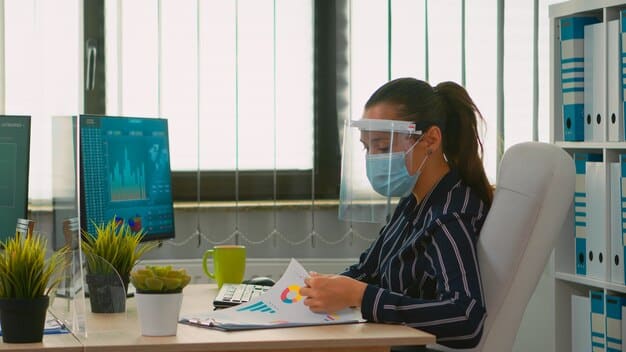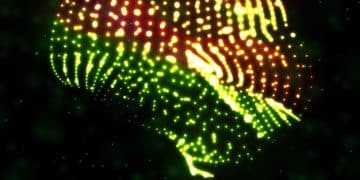Attention Deficit: New Focus Strategies for 2025

The Latest Research on Attention Deficit: New Focus Strategies for 2025 explores innovative approaches to managing attention deficit disorders, focusing on technological advancements, personalized treatment plans, and holistic wellness techniques for improved focus and cognitive function.
Are you seeking effective strategies to enhance focus and manage attention deficit? The Latest Research on Attention Deficit: New Focus Strategies for 2025 offers a comprehensive look at cutting-edge techniques and research-backed approaches to improve your cognitive abilities and overall well-being.
Understanding Attention Deficit: An Overview
Attention deficit, often characterized by difficulty focusing, impulsivity, and hyperactivity, affects millions worldwide. This section provides an overview of what attention deficit is and its broad impact on individuals.
Understanding the different types of attention deficit helps tailor effective strategies. Let’s delve into the specifics.
Types of Attention Deficit
Attention deficit manifests differently in individuals. There are primarily three recognized types:
- Predominantly Inattentive: Difficulty paying attention, easily distracted, forgetful in daily activities.
- Predominantly Hyperactive-Impulsive: Fidgeting, difficulty staying seated, blurting out answers, interrupting others.
- Combined Presentation: Demonstrates both inattentive and hyperactive-impulsive symptoms.
Each type requires a unique approach for effective management and focus enhancement.
Common Challenges Faced
Attention deficit poses a wide array of challenges across various aspects of life:
- Academic Struggles: Difficulty completing assignments, poor organization, and maintaining focus in class.
- Workplace Difficulties: Challenges in meeting deadlines, managing tasks, and staying focused during meetings.
- Relationship Strains: Impulsivity and inattentiveness can cause misunderstandings and communication issues.
Addressing these challenges with targeted strategies can significantly improve quality of life.
Understanding the core challenges associated with attention deficit is the first step toward implementing effective focus strategies. Recognizing these difficulties helps in developing personalized approaches.
Technological Innovations in Focus Enhancement
Technology is rapidly evolving to offer innovative solutions for focus enhancement. These tools provide new opportunities for individuals to manage attention deficit.
From brain-training apps to wearable devices, technology is at the forefront of helping people improve their concentration. Let’s explore the latest advancements.

Brain-Training Apps
Brain-training apps are designed to improve cognitive skills through interactive games and exercises:
- Neurofeedback Apps: Monitor brainwave activity and provide real-time feedback to improve focus.
- Cognitive Training Games: Enhance memory, attention, and problem-solving skills through engaging activities.
- Mindfulness Apps: Promote relaxation and reduce mind-wandering through guided meditation exercises.
These apps can be beneficial in improving mental focus over time.
Wearable Devices for Focus
Wearable technology is emerging as a powerful tool for tracking and enhancing focus:
- EEG Headbands: Monitor brain activity and provide data-driven insights into concentration levels.
- Biofeedback Devices: Track physiological signals like heart rate variability to help manage stress and improve focus.
- Smart Glasses: Offer augmented reality features to minimize distractions and enhance task management.
These devices provide personalized feedback to optimize focus throughout the day.
Technology offers exciting possibilities for enhancing focus and managing attention deficit. Integrating these innovations into daily routines can lead to significant improvements in cognitive performance.
Personalized Treatment Plans for Attention Deficit
Personalized treatment plans are essential for effectively managing attention deficit. These tailored approaches address the unique needs of each individual.
One-size-fits-all solutions are rarely effective. Personalized plans consider individual symptoms, lifestyle, and preferences. Here’s how they work.
Importance of Individualized Approaches
Why are personalized treatment plans so critical?
Because they acknowledge that each person’s experience with attention deficit is unique.
Factors such as genetics, environment, and co-existing conditions influence how attention deficit manifests. Tailoring interventions ensures that individuals receive the most effective support.
Components of a Personalized Plan
A comprehensive personalized treatment plan includes multiple components:
- Diagnostic Assessments: Thorough evaluations to identify specific strengths and weaknesses.
- Therapeutic Interventions: Cognitive behavioral therapy (CBT), occupational therapy, and other specialized treatments.
- Medication Management: Judicious use of medications to address core symptoms, under careful medical supervision.
Combining these components ensures a comprehensive and targeted approach to managing attention deficit.
Personalized treatment plans offer a tailored approach to managing attention deficit, leading to more effective and sustainable outcomes. Understanding individual needs is paramount for success.
The Role of Holistic Wellness in Enhancing Focus
Holistic wellness plays a crucial role in enhancing focus and managing attention deficit. Focusing on mental, physical, and emotional wellbeing can significantly improve cognitive function.
Lifestyle choices impact attention as much as any medication or therapy. Let’s delve into the holistic strategies that work.

Mindfulness and Meditation
Mindfulness and meditation techniques can improve focus by reducing mind-wandering and enhancing self-awareness:
- Mindful Breathing: Focusing on the breath to anchor attention and calm the mind.
- Body Scan Meditation: Bringing awareness to different parts of the body to enhance interoception and reduce stress.
- Loving-Kindness Meditation: Cultivating positive emotions to improve overall well-being and focus.
Regular practice can lead to improved sustained attention and emotional regulation.
Nutrition and Exercise
Proper nutrition and regular exercise are essential for optimal brain health and focus:
- Balanced Diet: Consuming nutrient-rich foods that support brain function, such as omega-3 fatty acids, antioxidants, and vitamins.
- Regular Exercise: Engaging in physical activity to improve blood flow to the brain, boost mood, and reduce symptoms of attention deficit.
- Hydration: Staying adequately hydrated to maintain cognitive function and prevent fatigue.
These lifestyle factors greatly influence overall cognitive performance.
Holistic wellness strategies provide a comprehensive approach to enhancing focus and managing attention deficit. Integrating these practices into daily life can lead to significant and lasting improvements.
Creating a Focus-Friendly Environment
The environment you live and work in has a significant impact on your ability to focus. Creating a focus-friendly space can minimize distractions and enhance concentration.
Simple changes to your surroundings can make a world of difference. Let’s look at how.
Minimizing Distractions
Reducing distractions is key to improving focus:
- Decluttering: Removing unnecessary items from your workspace to create a clean and organized environment.
- Noise Reduction: Using noise-canceling headphones or creating a quiet zone to minimize auditory distractions.
- Digital Detox: Limiting exposure to social media and electronic devices during focused work periods.
Creating a distraction-free environment is essential for productivity.
Optimizing Workspace
Designing a workspace that supports focus involves several key elements:
- Ergonomics: Ensuring proper posture and comfort to reduce physical discomfort and fatigue.
- Lighting: Using natural light or full-spectrum lamps to improve mood and alertness.
- Plants: Incorporating greenery to enhance air quality and create a calming atmosphere.
An optimized workspace can significantly improve concentration and efficiency.
Creating a focus-friendly environment is crucial for maintaining attention and productivity. Implementing these strategies can transform your workspace into a haven for concentration.
Future Trends in Attention Deficit Research
The field of attention deficit research is continually evolving. Several emerging trends promise to revolutionize how we understand and manage this condition.
From genetic studies to advanced neuroimaging, the future holds exciting possibilities. Let’s explore these trends.
Genetic Studies
Genetic research is providing insights into the underlying causes of attention deficit:
- Identifying Genes: Pinpointing specific genes that contribute to attention deficit risk.
- Personalized Medicine: Tailoring treatments based on an individual’s genetic profile.
- Early Detection: Developing genetic screening tools to identify at-risk individuals early in life.
Genetic studies are paving the way for more targeted and effective interventions.
Advanced Neuroimaging
Advanced neuroimaging techniques offer a deeper understanding of brain function in individuals with attention deficit:
- Functional MRI (fMRI): Mapping brain activity during cognitive tasks to identify areas of dysfunction.
- Diffusion Tensor Imaging (DTI): Examining the integrity of white matter tracts to understand connectivity issues.
- Near-Infrared Spectroscopy (NIRS): Monitoring brain oxygenation levels to assess cognitive effort.
These technologies provide valuable insights into the neural basis of attention deficit.
Future trends in attention deficit research promise to transform diagnosis, treatment, and management. Continued advancements in genetics and neuroimaging will lead to more effective and personalized interventions.
| Key Point | Brief Description |
|---|---|
| 🧠 Tech Innovations | Apps & devices enhancing focus via brain training and feedback. |
| 🌱 Holistic Wellness | Mindfulness, diet, and exercise improve cognitive function. |
| 🤝 Personalized Plans | Tailored treatments addressing individual needs and symptoms. |
| 🔬 Future Research | Genetic studies & neuroimaging advancing diagnosis and treatment. |
FAQ
▼
Attention deficit is a neurodevelopmental condition characterized by difficulties in maintaining focus, controlling impulsivity, and managing hyperactivity. It affects both children and adults.
▼
Technology offers brain-training apps and wearable devices that provide real-time feedback and improve cognitive skills, helping individuals manage distractions and enhance concentration.
▼
Personalized treatment addresses the unique needs of each individual, considering their specific symptoms, lifestyle, and preferences to provide the most effective and targeted support.
▼
Holistic wellness, including mindfulness, proper nutrition, and regular exercise, greatly enhances cognitive function, reduces stress, and improves overall well-being, leading to better focus.
▼
Creating a focus-friendly environment involves minimizing distractions, optimizing your workspace with ergonomics and proper lighting, and incorporating elements that promote calmness and concentration.
Conclusion
As research continues to evolve, novel methods for managing attention deficit are emerging, offering hope for improved focus and cognitive performance. By integrating technological innovations, personalized treatment plans, and holistic wellness strategies, individuals can expect a brighter future with enhanced attention and overall well-being. The latest discoveries emphasize the importance of tailoring approaches to individual needs and continuously adapting methods for optimal results.





